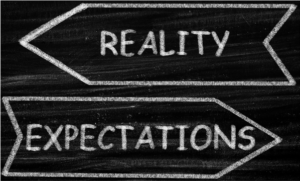What Are Your Expectations?
Expectations. We all have them. We expect things of ourselves, and we expect things of others – with the latter often leading to disappointment (especially if you are a type-A perfectionist like myself). We can trust no one to do the job right. Or, if we do decide to trust them, we nearly have an aneurysm trying to suppress the urge to redo all of their work the ‘right way.’ One of the many things my psychologist says I must learn to ‘accept.’ Anyways, you also probably have an expectation that my blog will actually get to some kind of point.
Facing Unmet Expectations
 So to start, I want you to think about the times when your expectations were unmet. I know my mother had expectations that my brother and I would do our part in cleaning the house growing up, and when we wouldn’t do it, or did not do it properly, she would become frustrated. Now I don’t have much recollection of what happened beyond that, but my brother and I now keep immaculately clean homes. The point is unmet expectations can often lead to issues.
So to start, I want you to think about the times when your expectations were unmet. I know my mother had expectations that my brother and I would do our part in cleaning the house growing up, and when we wouldn’t do it, or did not do it properly, she would become frustrated. Now I don’t have much recollection of what happened beyond that, but my brother and I now keep immaculately clean homes. The point is unmet expectations can often lead to issues.
Unmet expectations can foster frustration, guilt, disappointment, failure, resentment, you name it. I see this happen with my clients all the time. They set the expectation that if I reduce my calories and start exercising religiously, I will reach X goal weight. Some certainly are successful. However, many do not meet their expectations and ultimately give up. Even if they feel better, are stronger, and happier – if they did not meet their goal weight, they wonder, “What’s the point?!”
The first mistake they made is they created this expectation based on comparing themselves to other people. “Karen from work lost weight doing X. That means it should work for me too!” OR, “Karen says she feels better from running every day, that means it will make me feel better too!”
The second mistake people make is they created an expectation around something primarily out of their control. How much weight you will lose, how quickly you will lose it, or how good you feel running is dictated by genetics, physiology, environment, and the like — all things that you can’t do a damn thing about.
If my blog has been meeting your expectations thus far, let me ask you a question:
What if?
Introducing the ‘What If?’ Principle
 What if you tried something with no particular expectation or end goal in mind? What if you let curiosity in and let whatever is going to happen, happen?
What if you tried something with no particular expectation or end goal in mind? What if you let curiosity in and let whatever is going to happen, happen?
Are you thinking, “What if I don’t know where the hell you are going with this, Dr. Dan?”
Let me tell you about the ‘What if?’ Principle! Now I am quite proud of this concept, as it might be something that I am the first in the world to proclaim. At least, that is what Dr. Google seems to be telling me. The ‘What if?’ Principle is meant to help you drop your expectations.
Here are some examples of this principle in action:
- “What if I had some more veggies with dinner tonight?”
- “What if I quit my job?”
- “What if I went for a walk after dinner?”
- “What if I did those things for a week?”
What would happen?!
 You might lose weight, or you might not. You might start a successful business or end up broke. You might feel great, or you might roll your ankle and curse my name for having to use crutches. The point is you have no idea what will happen until you do it! There is no expectation about the result. There is just an open curiosity to whatever the possibilities might be!
You might lose weight, or you might not. You might start a successful business or end up broke. You might feel great, or you might roll your ankle and curse my name for having to use crutches. The point is you have no idea what will happen until you do it! There is no expectation about the result. There is just an open curiosity to whatever the possibilities might be!
If it feels good, well, what if you go for a walk every night for a month? If it feels terrible, well, what if you do something else that works for you?
Now I know the pessimists in the crowd are saying, “What if I step in dog poop during my walk?! Huh? What then?” To them, I say, “Well, you best pull together an HOA meeting and find out who ain’t picking up their dog’s sh*t. Or, go home, clean it off, and move on with life.”
Everything in life involves risk, including sitting on the couch with your grandma knitting mittens – an errant knitting needle could do some serious damage. You already take risks every day. If you want to change your life, lifestyle, or lose weight, you are going to have to take a chance.
——-
The ‘What if?’ Principle provides an opportunity to see what can happen, with no expectations — only endless possibilities.
What if you tried something new today?
What if, indeed?
Until next time!






